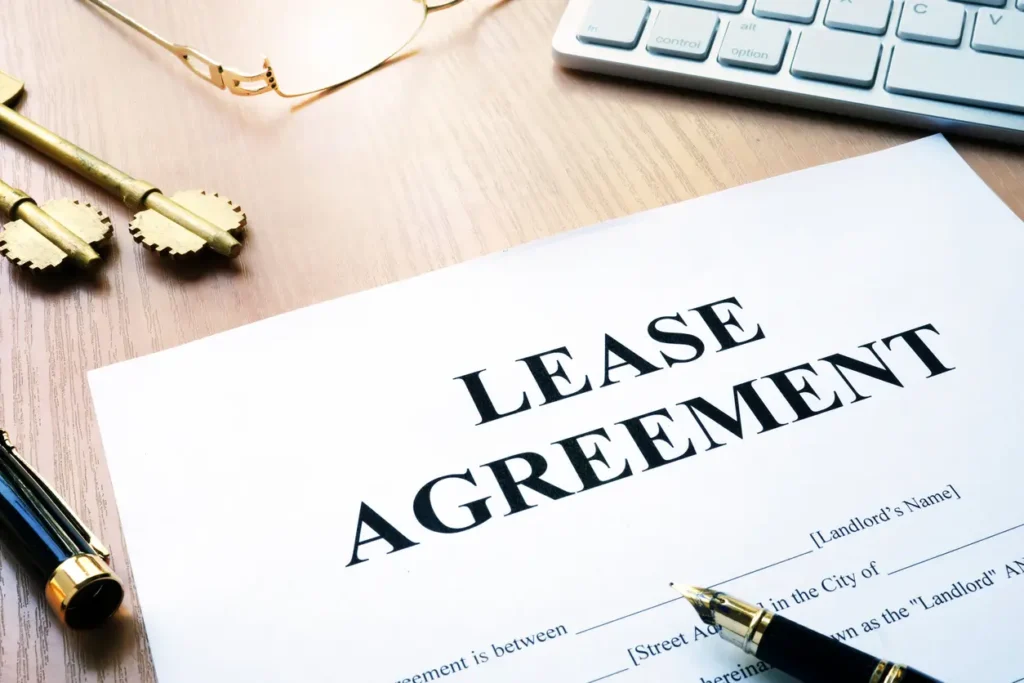Legal and Ethical Considerations in Lease Enforcement
When managing rental properties, it’s crucial to understand the legal and ethical considerations involved in lease enforcement. Compliance with Missouri state laws and local regulations in Chesterfield and surrounding areas ensures that property managers operate within legal boundaries.
Understanding eviction procedures, including notice requirements and court processes, helps maintain transparency and fairness. Additionally, adhering to fair housing laws is essential to preventing discrimination claims and promoting equal housing opportunities for all.

Understanding Lease Agreements
Understanding lease agreements is crucial for both landlords and tenants to ensure clarity on terms, responsibilities, and legal protections.
Communication with Tenants
Clear, respectful, and transparent communication with tenants is essential for effective lease enforcement. At Avenue Residential Leasing & Management, we prioritize open channels of communication to ensure tenants fully understand their lease terms.
This proactive approach helps prevent misunderstandings and fosters a positive landlord-tenant relationship. Regular updates, prompt responses to queries, and clear explanations of lease clauses are integral to maintaining transparency and trust.
Conflict Resolution
Conflicts can arise in any rental situation, but resolving them amicably and ethically can prevent escalation to legal disputes. Property managers should adopt strategies such as mediation and negotiation to address tenant concerns.
Listening to tenant grievances, understanding their perspective, and finding mutually acceptable solutions are key components of effective conflict resolution. By addressing issues promptly and fairly, property managers can maintain harmony and avoid the costs and stress associated with legal actions.
Maintaining Professionalism
Maintaining professionalism and integrity in all interactions with tenants is crucial for property managers. This means adhering to ethical standards, being consistent in enforcing lease terms, and treating all tenants with respect and fairness.
Professionalism extends to all aspects of property management, from handling maintenance requests to managing rent payments and addressing complaints. By upholding high standards of conduct, property managers can build a reputation for reliability and trustworthiness, which is essential for successful lease enforcement and overall property management.
Legal Aspects of Lease Enforcement
Understanding the legal aspects of lease enforcement ensures that both landlords and tenants at Avenue Residential Leasing & Management comply with local, state, and federal regulations, protecting their rights and responsibilities.
Regular Property Inspections
Regular property inspections play a crucial role in preventing lease violations. By conducting systematic inspections, property managers can identify potential issues early on, ensuring that tenants adhere to the terms of their lease agreements.
These inspections can help uncover unauthorized alterations, maintenance issues, or other lease violations that may otherwise go unnoticed. Moreover, regular inspections demonstrate to tenants that the property management team is vigilant and committed to maintaining the property’s standards, thereby encouraging tenants to comply with their lease agreements.
Documentation and Record Keeping
Meticulous documentation and record-keeping are essential components of effective lease enforcement. Every interaction with tenants, including communications, maintenance requests, and lease enforcement actions, should be thoroughly documented.
This comprehensive record-keeping serves multiple purposes: it provides a clear history of tenant behavior, supports the property manager’s actions in case of disputes, and ensures compliance with legal lease requirements. Proper documentation helps protect both the property management company and the tenants, creating a transparent and accountable environment.
Tenant Education
Educating tenants about their rights and responsibilities under the lease agreement is a proactive approach to lease enforcement. Providing clear and comprehensive information about lease terms, property rules, and the consequences of violations can help prevent misunderstandings and disputes.
Property managers can offer tenant handbooks, conduct lease orientation sessions, and send regular reminders to reinforce key points. By fostering a well-informed tenant community, property managers can reduce the likelihood of lease violations and promote a harmonious living environment.
Ethical Considerations in Lease Enforcement
When managing rental properties, ethical considerations play a crucial role in maintaining a fair and respectful relationship between landlords and tenants. Avenue Residential Leasing & Management in Chesterfield, MO, prioritizes ethical practices in lease enforcement to ensure both parties’ rights and responsibilities are upheld. Here are some key ethical considerations in lease enforcement:
- Transparency and communication
- Fair treatment
- Privacy and respect
- Reasonable enforcement
- Conflict resolution
- Legal compliance
- Tenant education
- Compassion and empathy
Best Practices for Property Managers
When it comes to lease enforcement, property managers must navigate a complex landscape of legal and ethical considerations. Here are some best practices to ensure compliance and maintain positive relationships with tenants:
Understand and Comply with the Fair Housing Act
The Fair Housing Act is a cornerstone of property management, prohibiting discrimination based on race, color, national origin, religion, sex, familial status, or disability. Property managers must ensure that all lease enforcement actions are free from bias and discrimination. This includes:
- Consistent Application of Rules: Apply lease terms and rules uniformly to all tenants.
- Training: Regularly train staff on Fair Housing laws and best practices.
Clear and Transparent Communication
Effective communication is key to preventing misunderstandings and disputes. Property managers should:
- Provide Clear Lease Agreements: Ensure that lease terms are clear and comprehensible. Highlight critical clauses such as rent payment schedules, maintenance responsibilities, and penalties for late payments.
- Document Communications: Keep detailed records of all communications with tenants, including emails, letters, and notes from phone calls or in-person meetings.
Regular Property Inspections
Regular inspections help identify potential issues before they escalate. Property managers should:
- Schedule Routine Inspections: Conduct inspections at regular intervals and provide tenants with adequate notice.
- Document Findings: Keep detailed records of inspection findings and any follow-up actions taken.
Promptly Address Maintenance Issues
Timely maintenance is not only a legal obligation but also a way to maintain tenant satisfaction. Property managers should:
- Establish a Maintenance Request System: Implement a system for tenants to report maintenance issues easily.
- Prioritize Repairs: Address urgent issues promptly and keep tenants informed about the status of their requests.
Enforce Lease Terms Fairly
Enforcing lease terms consistently is crucial for maintaining order and fairness. Property managers should:
- Set Clear Policies: Establish clear policies for common issues such as late rent payments, noise complaints, and unauthorized pets.
- Follow Due Process: Ensure that any enforcement actions, such as issuing warnings or initiating evictions, follow the legal requirements and due process.
Stay Informed About Local Laws
Local laws can vary significantly, and staying informed is essential for compliance. Property managers should:
- Regularly Review Local Regulations: Stay updated on changes to local housing laws and regulations.
- Consult Legal Experts: When in doubt, seek advice from legal professionals to ensure compliance with all applicable laws.
Foster Positive Tenant Relationships
Building positive relationships with tenants can lead to better cooperation and fewer disputes. Property managers should:
- Be Responsive: Respond to tenant inquiries and concerns promptly.
- Encourage Feedback: Create opportunities for tenants to provide feedback on their living experience and lease services.
By adhering to these best practices, property managers can navigate the complexities of lease enforcement while maintaining ethical standards and legal compliance. This not only protects the property management company but also fosters a positive and respectful living environment for tenants.
Final Thoughts
Legal lease and ethical considerations in lease enforcement are crucial for maintaining a fair and transparent rental market lease. Avenue Residential Leasing & Management prioritizes compliance with the Fair Housing Act and other relevant laws to ensure all tenants are treated with respect and dignity.
By adhering to ethical standards and legal requirements, property managers can foster positive relationships with tenants and minimize disputes. Whether you’re a landlord or tenant in Chesterfield, MO, understanding these considerations can help create a harmonious living environment.







